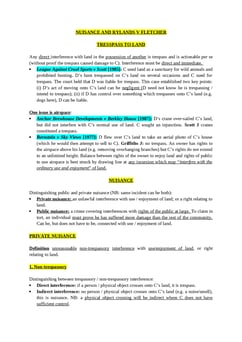Reynolds v Times Newspapers [1999] 4 All ER 609
Judgement for the case Reynolds v Times Newspapers
Plaintiff sued a newspaper Defendant that accused him of lying when he had been PM of Ireland.
Defendant argued that all political matter should be covered by qualified privilege.
HL rejected this since it would provide inadequate protection for reputation and it would be highly impractical to distinguish between political and non-political matter.
The only common law protection was where Defendant had a duty to publish the material (e.g. as with Hansard) and the recipients had an interest in receiving it.
Here, the publication was not one which should in the public interest be protected by privilege in the absence of proof of malice (i.e. qualified privilege).
Lord Nicholls
Says that in areas of public interest the default position is to give priority to freedom of speech.
However there were circumstances where the claim was so serious that priority should not be given to freedom of speech over defamation claim.
He rejected the requirement of a circumstantial test that the CA had proposed (whether the circumstances merited a qualified privilege) in addition to simple interest and duty as it would cause unnecessary confusion.
-
Whether there is a duty to publish or interest in publishing depends on:
Seriousness of the allegation/urgency of the matter;
Sources of the information;
Steps taken to verify info;
Whether an investigation is already ongoing;
Whether comment was sought from the plaintiff/contained the gist of Plaintiff’s side of the story;
Tone of the article (“it need not adopt allegations as statements of fact”).
Lord Hope (dissenting on the result; not the method)
Says that a generic qualified privilege for political topics in the press was bad because of impossibility of definition and lack of protection for defamation victims.
To attract privilege the report must have a qualitative content (public interest) sufficient to justify the defence should the report turn out to have included some misstatement of fact.
He then says, and is supported by Lord Nicholls in asserting, that circumstances of the report and how it is made (i.e. NOT a report based on hearsay) should be taken into account.
He dissented partly on principal because he though questions such as whether Plaintiff’s side of the story had been heard were relevant to malice and not to whether privilege existed in the first case.
Lord Steyn (dissenting on the conclusion but agreeing on the method)
The generic and circumstantial tests are unworkable.
Therefore the duty and interest tests should be used.
----
By substituting the test of malice for negligent reporting (inferable from Nicholls’ speech) for whether a privilege is misused undermines the defence of qualified privilege.
Professor Weir: It is odd that the circumstantial test was rejected: how can a duty/interest in publishing material be assessed without looking at the circumstances? Also the duty/interest test is problematic: Surely there is only a public interest in publishing accurate material. It would therefore be odd for a court to hold that a lie was published because in the public interest.
RELATED CASES
For Further Study on Reynolds v Times Newspapers
Need instant answers? Our AI exam tutor is here to help.
Ask questions 🙋 Get answers 📔 It's simple 👁️👄👁️
Our AI is educated by the highest scoring students across all subjects and schools. Join hundreds of your peers today.
Get StartedSimilar Cases
Related Product Samples
These product samples contain the same concepts we cover in this case.

 Since 2010, Oxbridge Notes has been a trusted education marketplace, supplying high-quality materials from top achievers at universities like Oxford, Cambridge, LSE, Harvard, and Yale.
Since 2010, Oxbridge Notes has been a trusted education marketplace, supplying high-quality materials from top achievers at universities like Oxford, Cambridge, LSE, Harvard, and Yale.